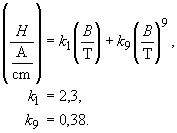compendium |
|
| Non-sinusoidal magnetising current
of a transformer The magnetising current of a transformer (at a sinusoidal primary voltage) contains odd-numbered harmonics of a higher order (overtones). The modulation of the magnetization characteristic far into the saturation range is typical for transformers used in power engineering (B > 2T). If the magnetization characteristic can be described sufficiently by the polynomial (with zero-symmetry) |
|
 |
(55) |
| (a frequently used approximation) then the spectrum of the magnetising
current also contains the 3rd, 5th 7th and 9th harmonic besides the fundamental
wave (1st harmonic). For a sinusoidal voltage |
(56) |
 |
|
| follows the magnetic flux density-time function | |
 |
(57) |
| and because of | |
 |
(58) |
| one obtains | |
 |
(59) |
| and with Ampere´s law the conlusion above on the magnetising current.
Using the experiments on non-linear distortion one can watch the occurence of higher harmonics in the course of the magnetic field force H(t) at sinusoidal magnetic flux density B(t) (if the B-H characteristic is beeing modulated into the saturation range). In the case of measuring transformer (B = 0,03 ... 0,05 T) and pulse trasformer (B = 0,4 T) the dimensioning of the magnetic circuit ensures that the modulation remains in the linear part of the B-H-characteristic. |